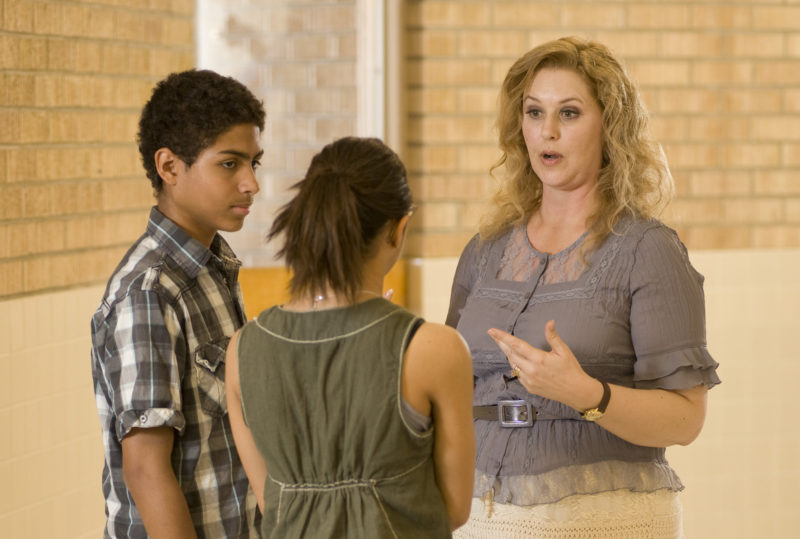 In everyday conversation, relying on labels and "scripts" is an easy but superficial way to talk about something that we may not know that much about (even if we think we do). This may be harmless enough, but it depends on the setting and circumstances. When we communicate with and about our students, the stakes are very high, says Mica Pollock. Using labels and other uninformed comments about their "groups," intelligence and communities slows students down. When it's done right, however, communication can be a powerful tool for equity - the focus of Pollock's new book, "Schooltalk: Rethinking What We Say About - and to - Our Students Every Day."
In everyday conversation, relying on labels and "scripts" is an easy but superficial way to talk about something that we may not know that much about (even if we think we do). This may be harmless enough, but it depends on the setting and circumstances. When we communicate with and about our students, the stakes are very high, says Mica Pollock. Using labels and other uninformed comments about their "groups," intelligence and communities slows students down. When it's done right, however, communication can be a powerful tool for equity - the focus of Pollock's new book, "Schooltalk: Rethinking What We Say About - and to - Our Students Every Day."
In addition to making a strong case for redesigning "schooltalk," the book is full of tools, resources, and action plans educators can use to, in Pollock's words, "match their speech to their values." Pollock, director of the Center for Research on Educational Equity, Assessment, and Teaching Excellence at the University of California, San Diego and a former high school teacher, recently spoke with NEA Today.
Tell us about the ideas behind "Schooltalk."
Mica Pollock: Schooltalk is about turning educators’ attention to the consequences of our most everyday, routine language. Every communication about a young person in schools is an action with serious equity implications. What we say shapes how adults think about and treat students, how students feel about themselves and their peers, and who gets which dollars, teachers, daily supports, and opportunities to learn.
If we pay attention to how we talk when we label students, discuss their outcomes, describe their “intelligence” or their communities, or describe their progress, their lives, and the opportunities they have and need, we have a powerful lever for constant equity effort in school. Part of that is responding to classic underinformed or denigrating comments about students’ “groups,” intelligence, or communities, for example.
So it’s about supporting young people whenever we talk. We are in this profession to support young people, right? So we just need to keep asking which schooltalk is harmful to young people, vs helpful to them.
Educators can be equity designers -- people who ask daily which actions and situations need to be improved so young people get the supports and opportunities they need" - Mica Pollock
This isn't just focused on classroom teachers. What you lay out in the book are strategies and plans that require involvment of the whole school community.
MP: Right. The book focuses most on the key people whose daily schooltalk shapes young people’s lives – like teachers, counselors, administrators, peers, parents, and community program staff, in addition to district folks. But schooltalk by politicians, journalists, community leaders, industry and university people, and everyone observing schools matters tremendously too, because it shapes public conversations, laws, and resource decisions. Think of the consequences if a politician talking about schools in “the inner city” frames young people as uninterested in reading, then floats a school funding bill.
As you and others have said, communication that can deflate a student doesn't necerssarily come from bad intentions. What are some of the ways we communicate to students that contribute to inequity?
MP: I think we can waste a lot of time in education trying to determine other people’s intentions, so we need to reconsider the claims we make about students regardless of our intentions. I’m trying to get us to think about the “scripts” we repeat without really fully knowing our students -- like the things we say about who is “smart,” whose communities “care,” whose performance is “high” or “low,” and many more examples.
When we label children quickly with words like “SPED kid” or “at risk,” for example, we quickly sum them up without sufficient knowledge. When we quickly sum up a community as “Asian” and assume an orientation to schooling without ever pushing for a more informed, precise understanding of people’s actual experiences, we miss a chance to fully support students and families.
Equity is one of those words that has been misused, or at least means different things to different people. How is the way that schools and society in general have viewed equity no longer adequate, if it ever was?
MP: With my definition of “equity,” I wanted a tent big enough that we could all get under it. The equity line of Schooltalk asks us to consider: are we doing what’s necessary to develop the full human talents of every student and all groups of students?
 The Equity Line serves as a reminder, Pollock writes, "to evaluate the consequences for young people of everything folks say about and to young people - in schools and in society at large."
The Equity Line serves as a reminder, Pollock writes, "to evaluate the consequences for young people of everything folks say about and to young people - in schools and in society at large."
Yes, the word “equity” can be a useful catch-all for “good efforts in education,” but if it gets too vague it gets milquetoasty instead of inspiring. I’ve tried to define an inspiring and comprehensive definition of “equity” effort that is actually pretty radical. What would it mean to pursue the full human talent development of every student and all groups of students in our schools? That’s the question I want educators asking every day.
Explain how educators can position themselves as "equity designers."
MP: I’ve always been focused on educators as people whose everyday actions change the world. Educators can be equity designers -- people who ask daily which actions and situations need to be improved so young people get the supports and opportunities they need. An equity designer is a person who is always questioning whether situations in schools are sufficient for supporting students, and then seeking to design and test new situations so students are sufficiently supported.
For example, I just worked with a school that decided to prioritize reconsidering their typical ways of talking about student achievement, to make sure they were talking precisely about what specific students could already do and needed to work on (and necessary improvements to their own instruction).
Another group of teachers I worked with recently wanted to rethink whether they made enough time in the school to talk about events in students’ lives. Others are designing new ways to talk with parents so that everyone is made aware of opportunities available.
 Mica Pollock, author of "SchoolTalk"
Mica Pollock, author of "SchoolTalk"
A lot of new educators are entering the profession over then next few years. What should they know as they try to to master their "schooltalk" - or at least begin the process - in their first few years?
MP: Mastery doesn’t ever happen. We are all in a lifelong process of learning to speak more knowledgably, more accurately, more helpfully, and more effectively, so that young people get the supports they need. I’m still learning to talk more accurately about inequality, for example - or in ways that convince people, or get them on board to support children in specific ways. And I’ll likely learn more as people critique my claims after they read the book!
It's also important to understand that we’re going to “mess up” in our schooltalk. But we just keep striving to talk more skillfully and helpfully. As I say in the book, the most helpful thing is to act like a learner.
Do you hear from educators that they are hesitant because this may come across as a "political" discussion? If so, what do you tell them?
MP: Since the election, we’ve seen a lot of teachers anxious even about actively speaking up to protect children being bullied and harassed by hateful speech. But it’s our responsibility to ensure that learning environments support children. So I think it’s key right now to clarify that the effort to support every child and all groups of children isn’t partisan. It’s what we’re in the profession to do. Sure, you can call it a “political” stance to stand up for all groups of children and for every child. But I think it’s essential to insist that this is the core of an educator’s work.
______________________________________________________
Mica Pollock has started a #schooltalking Facebook group and website to collect and discuss schooltalking examples from people’s schools and to answer questions about the book. You can also find her on twitter @micapollock.






